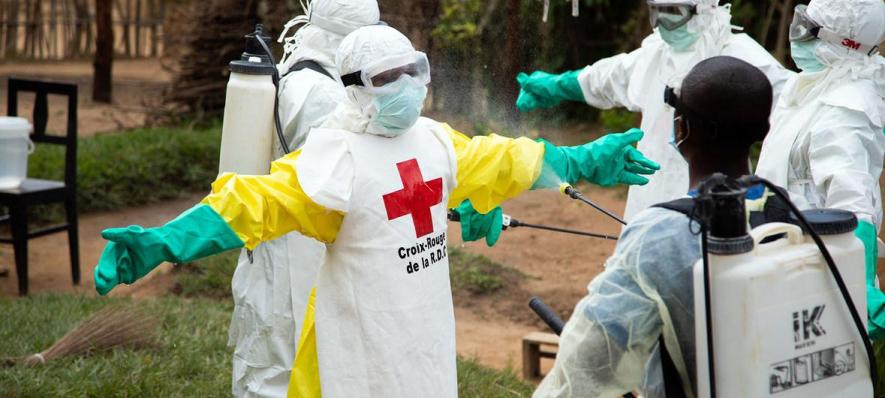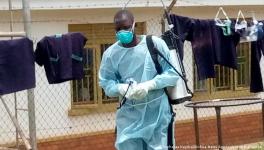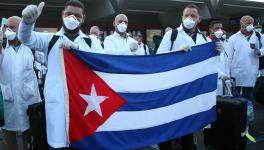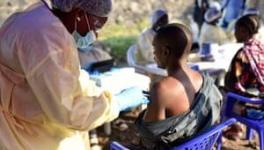Ebola: New Treatment Found Highly Effective in Congo

Image for representational use only.Image Courtesy : UN News.
A way forward in treating Ebola has been achieved, after two out of four experimental trials carried out in Democratic Republic of Congo (DRC) were found to be highly effective in saving patients’ lives. The preliminary results were reported yesterday, August 12, by Anthony Fauci of the United States National Institute of Allergy and Infectious Disease (NIAID), Maryland. The two successful trials will now be made widely available and it is thought that it would help in bringing an end to the yearlong outbreak in the DRC. The DRC has witnessed almost 1,800 deaths due to Ebola infection.
The trial has been named PALM trial—short for the Swahilli expression pamoja tulinde misha, meaning together save lives. The PALM trial evaluated three Ebola antibody preparations and an anti viral drug. It was done in a randomised controlled trial and carried out in the eastern provinces of DRC.
The head of DRC’s National Institute for Biomedical Research in Kinshasa, Jean Jacques Muyembe Tamfum, said at a press conference, “Today, we have started a new chapter. From now on, we will no longer say that Ebola is not curable. This advance will, in the future, help save thousands of lives.” Notably, Muyembe was a part of the team that discovered Ebola 43 years back.
Also read: Ebola Outbreak Declared as International Health Emergency by WHO
Fauci told in an interview to Science, “In the middle of the worst possible conditions, a very solid clinical trial was done that has given us very important information. And the beauty of it is that you can now immediately apply it in the field.”
So far, there were no drugs that could have cured Ebola. In the current DRC outbreak, two-thirds of all the affected have died. The efforts made by the scientists to treat the outbreak have been using existing drugs and also developing new treatments to deal with the virus. One of these is the ZMapp and was thought to be a potential treatment during the West African epidemic. But ZMapp was not proven to be very effective. But in a trial where 71 patients were taken, 36 received ZMapp in addition to the standard care. However, this failed to show a significant effect on mortality. There have been many other therapeutic endeavours as well, but all went empty-handed.
In the latest PALM trial, along with ZMapp, three other trials were compared. These are:
-
REGN-EB3, which is a combination of three monoclonal antibodies that were developed by Regeneron Pharmaceuticals in New York.
-
Another monoclonal antibody mAB114, which is rooted in the 1995 outbreak of Ebola in Kikwit, DRC. During that time, Muyembe tried to treat patients with a mixture of antibodies that were extracted from those who could survive Ebola.
-
The third one is the drug remdisivir.
The PALM trial was started in November 2018 in DRC and was done among communities like Beni, Butembo, Katwa, Mangina. The initial aim was to enroll 725 patients in the trial. But in an independent survey done by a data and safety monitoring board, they reviewed 499 patients that underwent the trial. What was found is that REGN-EB3 is much better than ZMapp.
Around 49% of the patients that received ZMapp and 53% that received remdesivir died. The mortality rate of those who received REGN-EB3 was found to be only 29%. Among those who received mAB114, mortality was found to be 34%. Moreover, in patients who received early treatments with the new therapeutics, reduction of mortality was found to be more successful. For those with high load of virus, even REGN-EB3 could not help in reducing mortality.
Fauci said, “The only thing that is sure is that mAb114 and [REGN-EB3] are clearly better than ZMapp and remdesivir.”
Get the latest reports & analysis with people's perspective on Protests, movements & deep analytical videos, discussions of the current affairs in your Telegram app. Subscribe to NewsClick's Telegram channel & get Real-Time updates on stories, as they get published on our website.























